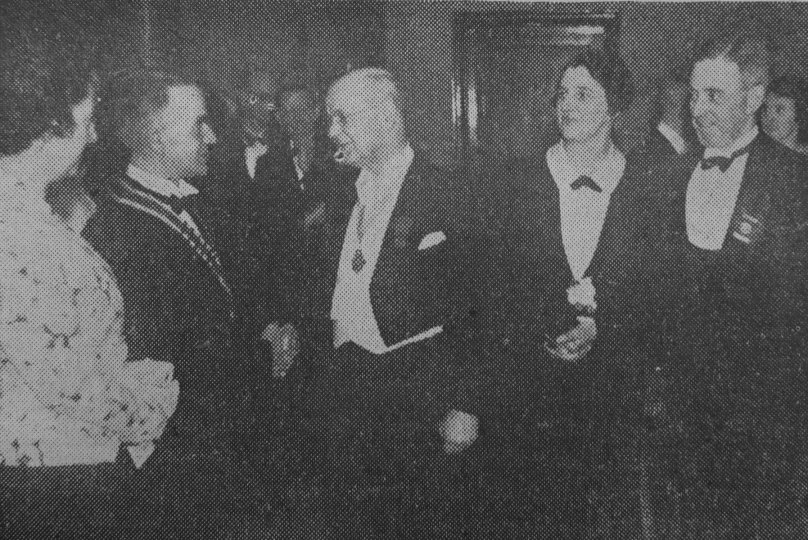Mexborough and Swinton Times January 27, 1940
Value of Rotary In A Troubled World
Exposition at Mexborough Club Dinner
Mr G. W. Jepps, the Mexborough President , and Mrs. Jepps , receiving the guests.

Tuesday’s annual dinner and dance of Mexborough and District Rotary club was as happy and enjoyable a social function as its many predecessors in spite of difficulties presented by war-time restrictions. There was a large gathering for dinner at the Empress Ballroom, and among the guests, who were received by the Mexborough President, Rotarian G. W. Jepps, and Mrs. Jepps, were Rotarian D. L. Staniland, President of Doncaster Rotary Club, and Mrs. Staniland: Rotarian and Mrs. Barker. Doncaster; Rotarian and Mrs. M. R. Cooper, Rotherham: Mr. and Mrs. W. P. Marsdin, Barnsley: Coun. G. S. Morley. J.P., Chairman of Mexborough Urban Council. and Mrs. Morley; Coun. F. Tingle. Chairman of Swinton Urban Council; and Inspector and Mrs. Waugh, Mexborough.
The principal speaker was Rotarian H. Morley, Chairman of No. 7 District, the Editor of the “Hucknall Dispatch,” Nottingham.
Two Years’ War?
Rotarian Morley congratulated the Club on going ahead with its arrangements: it was obviously not daunted by the black-out. As a journalist he was often asked how long the war would last. In the beginning he estimated between eighteen months to two years: so far, he saw no reason to change that estimate, though after the deadlock on the Western Front it seemed more likely to be ten years.
What was Rotary? It was an ethical movement. And what were ethics? They were the science of moral duty which was often overlooked and neglected. They represented a way of living: the best way. Rotary urged upon its members in business and professional life the adoption of a high ethical standard. Their emblem was a cog wheel—and every cog must function properly if the wheel was to function properly. The wheel was keyed to the shaft of service, and lubricated by friendship.
Rotarian Morley referred to the objects of Rotary which, he said, at one time numbered five, later became six, and subsequently were reduced to four. Running through those objects was the ideal of service, and it was this they urged Rotarians to adopt. He hoped that if the number of objects was reduced again the result would be “Ideal of service and goodwill to mankind everywhere.” Rotary had been handicapped by the international situation, but it could not be put into concentration camps. The day would dawn when it would be operating in those totalitarian countries from which it had been banished. Rotary was a spirit that could not be quenched. While they, as members, were cogs in Rotary, so too, were they cogs in the greater machine of the world. During the last few years the world had, by modern science, been cramped into a neighbourhood. Rotary had the job of making people good neighbours.
Mixed Blessings Of Progress.
Rotarian Morley spoke of the mixed blessing of wireless and the unhappy use to which the development of aircraft had been put, and said the tragedy was that ninety per cent. of the peoples of the world wanted peace. Unfortunately, one per cent. wanted war, and so it would continue until they achieved a society of nations in which the policeman replaced the soldier. The best form of message he could offer was an exhortation—that members be loyal to Rotary and observe its principles and all they stood for. “Be useful cogs. Apply Rotary principles. Let us rise above the average. When you lay down your arms it will not be whether you won or lost, but how you played the game.”
Responding, Rotarian G. W. Jepps thanked Rotarian Morley and recalled that it was through his meeting with Rotarian C. Marks at a San Francisco Conference that the invitation had been extended.
Rotarian Jepps spoke of the development of Rotary, and said it had continued to progress in all but the aggressor countries–Germany and Russia. There were, nevertheless, good Rotarians in those countries. There, Rotary had been suppressed because it was a force for international goodwill and trust. Its ideals were incompatible with a creed which aimed at creating strife and bitterness between nations, the glorifying of war, and the destroying of human liberty and rights. In every country where men could freely associate for good, where the value of the individual was respected. Rotary was looked upon as a beneficial movement and enjoyed respect. The motto was “Service Above Self.” and their chief principle was fellowship. Paul Harris (the founder), had given to the world a fine power for good.
A “Happy Family.”
Rotarian Jepps referred to the growth of the Mexborough Club and spoke of the excellent record of attendance which, he said, was one of the vital factors to a successful club. They were “really a happy family.” He had been a Rotarian for thirteen years, and had enjoyed every meeting.
The toast “Ladies and Visitors” was offered by Rotarian K. Beeson, Vice-President of the Mexborough Club. Rotarian Beeson referred to the large gathering and said in these days of restrictions it was gratifying to see so many present.
Mrs. C. M. Hattersley charmingly responded, and said such happy occasions on which they could forget the outside world were, at this time, very few and far between.
The toastmaster was Rotarian D. W. Harrop. Dancing followed to music by Bert Clegg and his band. The M.C.’s were Rotarians T. Flather, M. Medcalf and H. May.
The arrangements for the function had been ably made by Rotarian T. Flather and his committee.
During an interval in the dancing, elocutionary items were given by Miss Constance Nichols, of Mexborough.